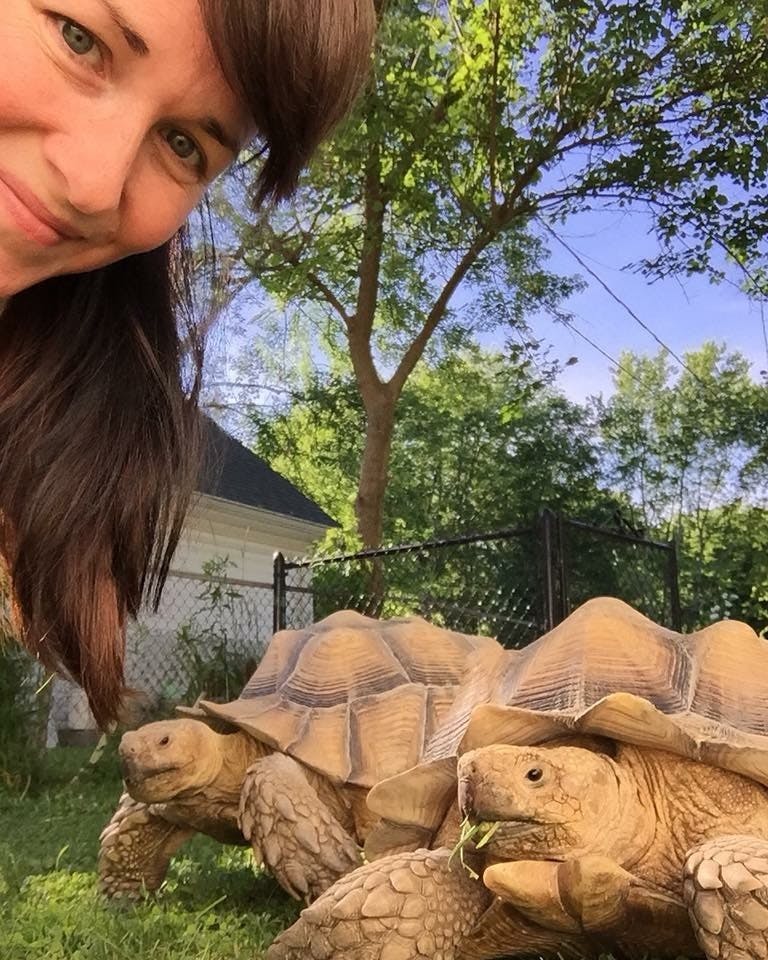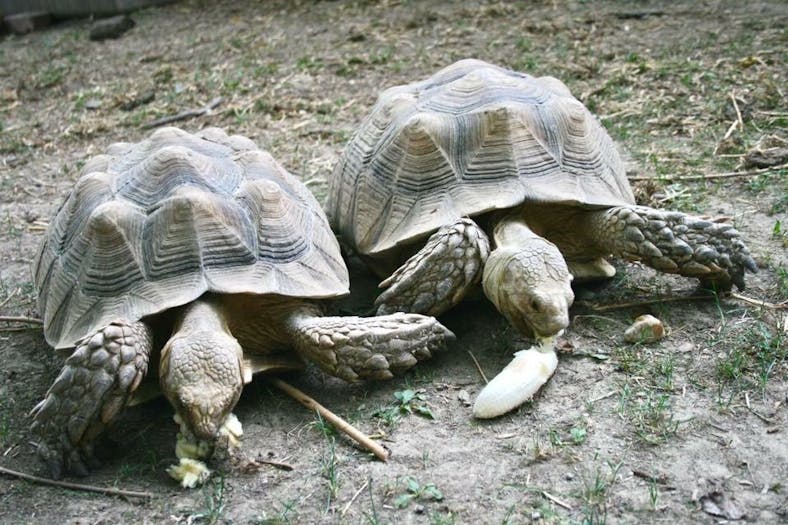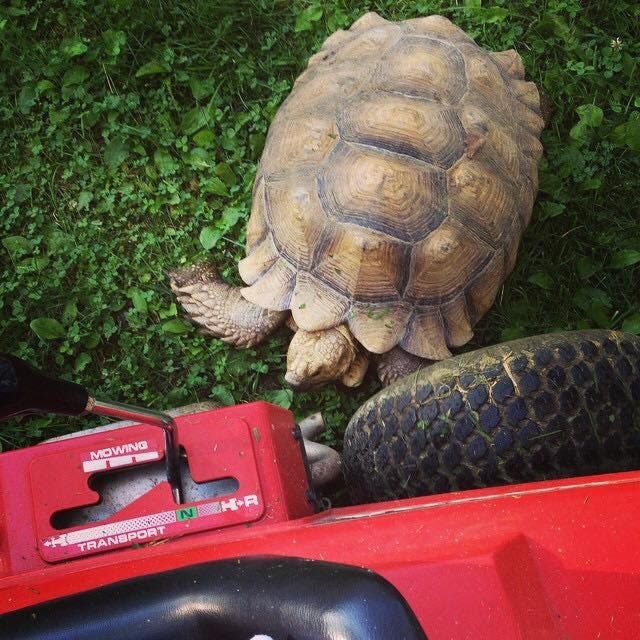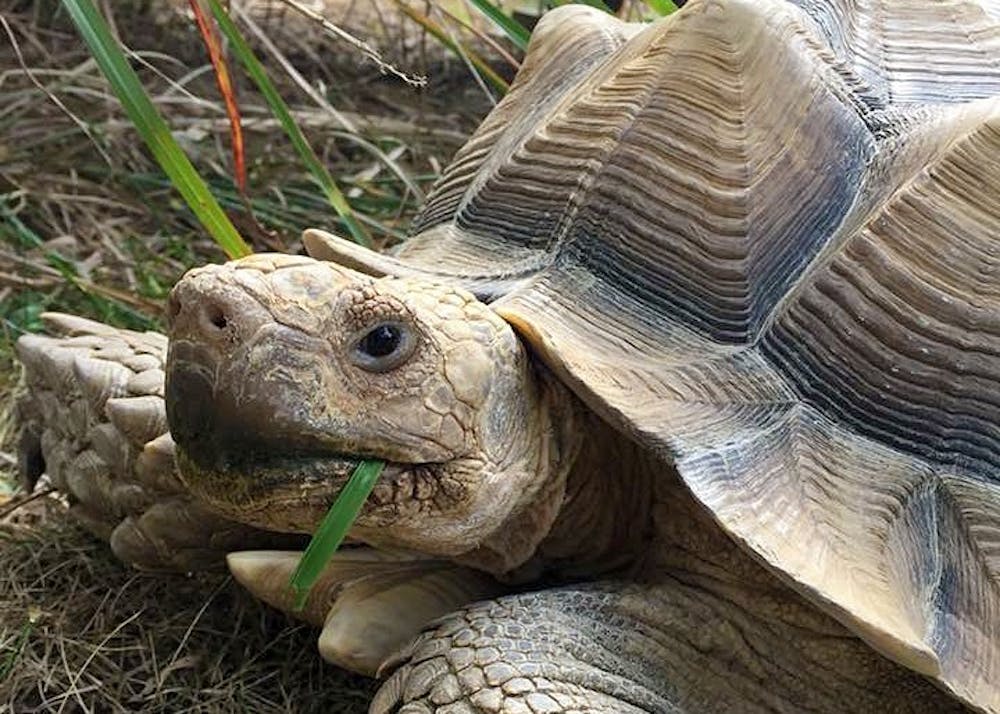On that Friday morning last year, Tasha Chapel, 35, noticed that Daisy, her other African sulcata tortoise, was in the backyard sunbathing without Merlin. She checked the yard, but he was gone. Soon neighbors and strangers were looking, too, and Tasha posted online about missing Merlin. In the middle of the search, a Zionsville police officer drove by, and Tasha gave him and the department a heads up.
Late that afternoon, several people said they had seen Merlin a street away from Tasha’s house, and they posted photos of him in front of a white fence. One of her friends suggested reaching out to a man who lived on that stretch of road. Tasha knocked on the man’s door. No answer. She called his number. No answer. She left a message. By then, it was getting dark, so she returned home.
Just after 10 p.m., the man called back.
“Have you seen my Merlin?” she asked. “Do you have him?”
“I’m sorry to tell you this,” she recalls the man answering. “But I did see him, and I shot him.”
***
In the police investigation and court case that followed, Brandt Lawson said he fired at least eight bullets from a .22-caliber long rifle into Merlin, and some bullets were aimed into his “head hole.” He said he did it because he thought Merlin was a dangerous snapping turtle.
Merlin’s violent death led Tasha to start a Facebook page called “Justice for Merlin.”
“Its horrific, inhumane, disgusting, murder, thievery, and absolutely a traumatic experience,” the page’s pinned post reads. “Our hearts are bleeding for our lost pet.”
Thousands of people responded to the page, some venting outrage.
“Merlin's Murderer SHOULD GO TO JAIL”
“i would put a bullet thru this mans head”
“Hopefully someone blows that mans brains all over the place so he can go to the lowest pits of hell where he belongs.”
Soon, Lawson had hired off-duty police officers to sit at the end of his driveway.
Burrowed into the details of the case was a simple question of whether the life of a tortoise mattered. Had Lawson committed a murder, or was he merely disposing of a problem?
The Boone County Prosecutor's Office filed a criminal charge against Lawson, but it only amplified the question. Tortoises – along with other cold-blooded animals and some common pets such as hamsters – are not classified as domestic animals under state law, so Lawson could not be charged with a felony. He was instead charged with criminal mischief for property destruction, a misdemeanor. Lawson and his attorney declined to speak with the Indiana Daily Student.
Sulcata tortoises can live for more than a century, and in captivity, they can outlive their human owners. Knowing this, Tasha had placed Merlin in her will, stipulating that upon her death the tortoise would go to her son. For less than a quarter of his life span, Merlin was — and still is, to Tasha — part of her family.

***
Sulcatas are native to the southern edge of the Sahara desert, though their population has been depleted in part due to habitat destruction and because they are often harvested for food and the pet trade. Their diet consists mainly of different grasses. They can be aggressive toward one another but rarely toward humans.
Now, sulcatas can be found on Craigslist, in pet stores and at shows like the one where Tasha bought Daisy and Merlin.
Sulcatas are often described as curious and personable and have different personalities, so some may be more friendly than others. Day Ligon, an associate professor of biology who studies turtles and tortoises at Missouri State University, said when compared to some other tortoises, sulcatas readily take to people and may stand around waiting for scratches on their necks. That’s one place Merlin liked to be scratched.
Dustin Smith, curator of reptiles and amphibians at the North Carolina Zoo, said sulcatas will inspect new visitors, possibly to see if they have food. They may also start to build a bond with people they see often, like their owners.
“It’s like having a dog with body armor,” Smith said.
Craig Stanford, the chair of the International Union for Conservation of Nature Tortoise and Freshwater Turtle Specialist Group and a professor at University of Southern California, has always been intrigued by the duality of a tortoise’s shell.
“How ironic,” he said, “that a tortoise that just seems utterly protected like a tank in armor, an armored tank, is utterly defenseless against humans.”
***
Since she was a little girl, Tasha has loved turtles and tortoises. She and her brother took care of two wild box turtles they named Spike One and Spike Two after the “The Land Before Time” character. She and her brother would take care of them outdoors in the summer and release them before hibernation season. But Spike One and Spike Two would come back to them the next year.
“I wish people could look at and learn from animals because, I mean it’s like, they love us no matter what,” Tasha said. “And people can be like, ‘Oh, reptiles don’t love you.’ No, I’m pretty sure mine do. I think we could all learn so much from them if we actually just slowed down for a minute.”
Tasha was preparing for her wedding when Merlin escaped and was killed on Aug. 31, 2017. That afternoon, her son and fiancé were working in the yard where Merlin lived with Daisy. The backyard was surrounded by a chain-link fence reinforced with zip-ties, stakes and shrubbery, and Tasha had added more reinforcements just two weeks before Merlin got out.
She still has no idea how he got out but suspects he was excited by the possibility of new friends and “sweet freedom.” By the time Tasha noticed he was missing, Merlin was already dead.
Lawson’s blunt statement that he shot Merlin still rings in Tasha’s ears. She was shocked. She hung up, cried and then called the Boone County Sheriff’s Office.
Lawson told Deputy Hannah Fisher, the county's animal control liaison, he had been outside working on his fence when he saw the animal in the road and thought it was an unusually large snapper. He called his next-door neighbors to let them know.
“There’s a huge snapping turtle coming across the road, and I just wanted to warn you,” Lawson said in a voicemail that was later included in the deputy’s report. “I saw the dogs were out a little while ago. Maybe you want to stay inside. I’m trying to set up so I can shoot it. I won’t shoot in your direction, but if it comes that way, I don’t want your dogs to try and get it or something because they’re awful dangerous.”
Pursuing the case, Fisher researched sulcatas and animal control laws and shared what she learned with prosecutors. As public outcry grew, Lawson's attorney's office released a statement.
“The man is devastated that he mistook the exotic pet for a potentially harmful animal,” the statement read. “He is hopeful that he will be able to meet with the pet’s owner to more fully express his sincere apologies.”
Tasha said Lawson told her he felt bad and that it all was an unfortunate situation. But she said she never heard him say the words “I’m sorry.” She also noted she received a letter threatening legal action if she did not remove Lawson’s name and location description from social media posts.

***
All of this — the court case, the anger and the confusion — highlights that question at the heart of the case: does the life of a tortoise matter?
Due to sulcatas’ vulnerable conservation status, some experts evaluate the importance of a tortoise’s life based on the role it plays in its natural environment. Others, though they noted the specific importance of wild tortoises, said they believed all animals mattered, too.
"The life of every animal matters,” Stanford, the USC professor, said. “The life of every living thing matters.”
Smith, the curator from the North Carolina Zoo, went further.
“Every species has their own role, and whether or not this one had any role in its particular environment, it doesn’t really matter,” he said. “It’s a tortoise. You can’t really get much less fearful of a turtle or a tortoise.”
It’s easy to misunderstand some animals, Smith said, either because of fear or a lack of caring. Many people may be able to identify a specific bird on their feeder, he said, but the same can’t always be said of reptiles.
"They’re not as appreciated as so many animals," he said. "And when something is not appreciated or cared about, it’s misunderstood, and the myths prevail."

***
The case against Lawson dragged on for months. Each time a court date drew near, Tasha’s anxiety would rise, only for Lawson and his lawyer to file for another continuance. Finally, in May, it ended. Lawson admitted to killing Merlin and agreed to pay $1,400 in restitution to Tasha. She asked that Lawson perform community service at the humane society, but that request was not granted. To Tasha, the outcome felt like a slap in the face.
Deputy Fisher isn’t surprised that Tasha is disappointed.
“You can’t really put a price on a life,” Fisher said. “I don’t think any amount of restitution would have ever sufficed.”
Tasha, now married, has become Tasha Chapel-Marsh. She and her family have moved away from Zionsville and are expecting a baby. Daisy made the move with them, and she still sunbathes in the backyard. Tasha believes the time after Merlin's death was confusing for her, and Tasha thinks about him almost every time she sees Daisy.
Merlin still isn’t back with his family. He’s in California where his bones are being cleaned. Kayla Kimberlin, a skeletal articulator based outside of Indianapolis, got in contact with Tasha after Merlin was killed. She offered to help send Merlin to a friend and colleague in California to assist in preserving him for Tasha and her family, and Tasha took her up on the offer after months of consideration.
Tom Keller, a skeletal articulator in California, said he had never seen an animal come to him in such a condition. He found at least seven bullets in Merlin, and both shoulder blades were shattered.
“It was just overkill for a non-threatening animal,” he said.
Once Keller is finished, Kimberlin will attempt to reassemble Merlin’s bones. If his bones are too damaged, she will arrange his remains in a memorial box with his likeness and dates of birth and death.
“He wasn't just a tortoise ... he was a member of their family,” Kimberlin said in a Facebook message. “I don't think it should be treated any differently than if that man had shot their dog. The fact he was a tortoise shouldn't make it any different.”
From his butt shakes to his dinosaur-like characteristics and child-like curiosity, Merlin brought joy to Tasha and her family. When Merlin is returned to Tasha, she will keep him in eye sight in her home, maybe in a lofted area in the living room.
In the time since his death, Fisher helped push through a new county animal control ordinance that was in the works when Merlin was killed. The new ordinance has an expanded county definition of domestic animal under which Merlin would have fallen, and it could have led to additional citations placed on top of the criminal mischief charge, Fisher said.
Fisher said she believes Merlin's death will be used as a catalyst for change within state laws. While Merlin wasn't protected at his time of death, future laws could help other animals and their owners. Tasha hopes that's the case, especially after Lawson's court agreement was minimal.
It might not be true justice, but she says pets like Merlin no longer being considered "personal property" is a small blessing.




